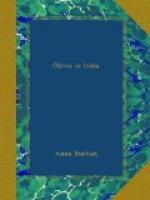Darjeeling is a pretty place tucked into the mountain-side. In the middle is the bazaar, and it happened to be market day, which made it more interesting. The village street was lined on both sides with open booths, some piled with fruit and vegetables, others, oddly enough, with lamps and mirrors and other cheap rubbish which bore the legend “Made in Germany,” others with all sorts of curios. The place was thronged with people. A few plainsmen and Tibetans Boggley pointed out, but most of the crowd were hill-people, jolly little squat men and women hung with silver chains and heavy ear-rings set with turquoises. Their eyes are very black and all puckered with laughing, and they have actually rosy cheeks.
They crowded round, trying to sell us curios and lumps of rough turquoise. When we asked the price of anything, they replied promptly, “Twenty rupees.” We would offer two rupees, and, after a few minutes’ bargaining, they took it quite cheerfully, the thing probably not being worth eight annas. I bought a prayer-wheel. It is a round silver thing with a handle rather like a child’s rattle, and inside are slips of paper covered with writing. These are the prayers, and at intervals you twirl the wheel round, and the oftener you turn it the more devout you are.
I also purchased some lumps of rough turquoise, though Boggley said they were not a good blue,—too pale,—and was tying them up in my handkerchief when Boggley gripped my arm. “Look!” he said. I looked straight across the valley, “Higher,” said Boggley, and I lifted my eyes literally to the skies; and there—“suddenly—behold—beyond”—were the everlasting snows.
All day they stayed with us, and as the sun was setting we climbed to a point of vantage to see the last of them. It has been said they are a snow-white wall barring the whole horizon. They are like a city carved by giants out of eternal ice, a city which lieth four-square. We watched while peak after peak faded into cold greyness; until Kangchenjunga towered, alone, rose-red into the heavens, sublime in its “valorous isolation.” Then the light left it too, and we turned and came down from the Hill of God.
We left for Calcutta at noon on Monday, and I had a thoroughly over-eaten, uncomfortable day, all owing to Boggley’s forethought. He said as we began breakfast about nine o’clock: “Now eat a good breakfast, for we shall have to leave before lunch, and no man knows when we shall get another meal.”
It seemed good common-sense, so I ate an egg and two pieces of toast after I had really finished. That was all very well, but the hotel people thoughtfully provided us with a substantial luncheon before we left. Even then Boggley kept on looking to the future.
“Oh, tuck in,” he said. “We shan’t get anything more till eight o’clock.”
I didn’t feel as if I wanted anything ever again, but I hurriedly gobbled some food, and we raced to the station, then sat in the train half an hour before it started.




